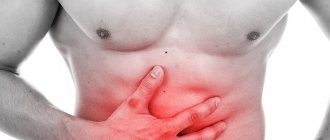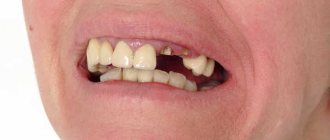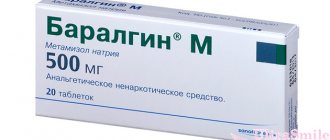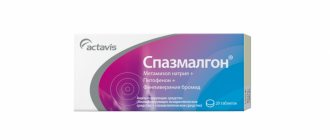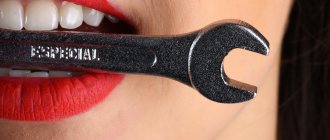From this article you will learn:
- why do teeth hurt, what emergency help is needed,
- what to do if a child has a toothache, how to numb the pain,
- toothache during pregnancy: what to do.
Pain in the teeth is always a sign of inflammation, regardless of whether it occurs in a damaged tooth or after treatment. You can urgently reduce pain in two ways: either by urgently seeking dental help, or
with the help of analgesics.
But you must understand that if you have a toothache, then in any case it will require the intervention of a dentist, and analgesics will only allow you to delay a visit to the doctor.
Content:
- Types of tablets for toothache
- The most popular painkillers for toothache 2.1. Medicines based on nimesulide 2.2. Products containing ketoprofen 2.3. Preparations whose active substance is ketorolac 2.4. Medicines including dexketoprofen 2.5. Medicines containing flupirtine 2.6. Products containing mebeverine 2.7. Medicines containing ibuprofen 2.8. Products containing paracetamol
- When is it okay to use painkillers?
If a tooth aches, it’s difficult to distract yourself from it. The physical discomfort associated with this deprives a person of the opportunity to lead a normal life and forces him to take various medications. Often, to relieve toothache , people take strong drugs for a long time.
It is clear that this approach to the problem cannot be called correct. If there is a need to use a painkiller, then there is a serious dental problem. It needs to be eliminated. Making an appointment with a dentist is the best solution in such a situation. There is no need to look for which pills can help for a long time. Medicines only remove negative symptoms, but do not cure the disease itself. By postponing therapy until later, you can face severe complications and even edentia.
FAQ
Why does toothache occur?
Tooth pain is caused by a number of circumstances and dental diseases. Let's look at them in more detail:
Hyperesthesia
This is excessive tooth sensitivity that occurs when the enamel layer is worn away. Pain occurs when the tooth is exposed to cold, hot or sour food.
Traumatic fractures
When a tooth is injured, part of the crown often breaks off and the nerve is exposed, which leads to severe, often aching pain.
Caries
This is the most common infectious dental disease. Caries gradually destroys the tooth. Often, caries pain occurs in response to eating cold or hot food. If caries is not treated, the tooth is completely destroyed.
Pulpitis
With pulpitis, the patient experiences severe and acute pain. Often attacks of pain occur at night. If pulpitis is not treated, the disease goes into a chronic stage, in which the pain is not so strong.
Periodontitis
This is an acute or chronic purulent inflammation of the periodontium - the tissue around the tooth root. With periodontitis, the patient is bothered by severe sharp pain. If left untreated, periodontitis becomes chronic.
Types of tablets for toothache
There are a lot of medications for teeth. They differ from each other in:
- active substance;
- dosages;
- pharmacological action;
- side effects;
- contraindications.
Each class fights its own “enemy”. Most often, patients in dental clinics are prescribed analgesics. Penetrating into the systemic bloodstream, they minimize stimulation of nerve fibers and prevent the passage of intense pain impulses.
As for antispasmodics, they cannot be called an effective dental pain reliever. Drugs in this group are more suitable for conditions caused by spasm of smooth muscles. They affect the sympathetic nervous system. Relieves discomfort due to disorders of the kidneys, gastrointestinal tract, gynecological pathologies, and migraines. However, with mild pain they can also help.
Many dental clinic clients are prescribed non-steroidal anti-inflammatory drugs (NSAIDs). These are drugs that have antipyretic and anti-inflammatory effects. They quickly stop the spread of inflammatory processes, including in the oral cavity.
Prevention of dental diseases
From a very young age, everyone knows what needs to be done to prevent teeth from hurting:
- Regular oral hygiene. You need to brush your teeth thoroughly, morning and evening, using a good toothpaste and brush. During the day, after each meal, you should rinse your mouth thoroughly, ideally using dental floss.
- Visit the dentist twice a year for preventative care.
- Eliminate any foci of infection in the oral cavity in a timely manner and carry out sanitation in a timely manner.
- Do not neglect modern methods of protecting teeth - fluoridation, remineralization, fissure sealing.
In addition, dental health largely depends on what we eat - the diet should include as many fresh vegetables and fruits, fish, and lean meat as possible; Eliminate sugar and sweets as much as possible. Teeth should be protected from mechanical damage, and do not overuse whitening toothpastes.
Author: Elena Grunina Dentist-therapist, endodontist. Work experience more than 9 years. The information is for reference only. Before treatment, consultation with a doctor is necessary.
The most popular painkillers for toothache
The list of pharmaceutical developments that effectively cope with negative dental symptoms can include those that contain:
- nimesulide;
- ketoprofen;
- ketorolac;
- dexketoprofen;
- flupirtine;
- mebeverine;
- ibuprofen;
- paracetamol.
Medicines based on nimesulide
This substance belongs to the class of NSAIDs and is recognized as a high-quality analgesic. But it should be used with caution for dental problems, as disturbances in the gastrointestinal tract, allergic and anaphylactoid reactions, swelling, urinary retention, shortness of breath, bronchospasm, and decreased visual acuity are possible.
Nimesulide is prohibited for treatment by children under twelve years of age, persons with bronchial asthma, stomach ulcers, Crohn's disease, and severe renal failure. It is also not suitable for pregnant and lactating women, alcohol and drug addicts.
Products with ketoprofen
Representative of the NSAID group. Shows anti-inflammatory properties. It is produced in the form of tablets, capsules, suppositories, solution for intramuscular and intravenous administration. The compound copes well with acute pain caused by deep caries and pulpitis. But patients with DU, kidney and liver pathologies, and blood clotting disorders should avoid using it.
The age limit for using ketoprofen is 18 years. It is also contraindicated for expectant and nursing mothers.
Drugs whose active substance is ketorolac
They perfectly relieve pain symptoms in diseases of the oral cavity and have a moderate antipyretic effect. The list of contraindications for use includes:
- hypovolemia;
- erosive and ulcerative lesions of the gastrointestinal tract during exacerbation;
- inflammatory bowel pathologies;
- severe kidney failure;
- hypocoagulation;
- kidney diseases.
Patients under 16 years of age cannot be treated with ketorolac.
Medicines including dexketoprofen
Dispensed strictly according to a doctor's prescription. Contraindicated for pregnant women, lactating women, people with diseases of the stomach and intestines, and a tendency to bleeding.
Most often dexketoprofen is well tolerated by patients, but sometimes causes arterial hypertension, skin rashes, bronchospasm, and erosive and ulcerative lesions of the gastrointestinal tract.
Medicines containing flupirtine
These are strong painkillers that fall into the category of centrally acting non-opioid analgesics. They help quickly cope with moderate discomfort in adults. Effective for negative symptoms caused by:
- voluminous carious cavity;
- inflammation of the neurovascular bundle;
- gingivitis;
- stomatitis;
- periodontitis.
Contraindicated for liver disease, alcoholism, elevated levels of liver enzymes, ringing in the ears, and under the age of eighteen. You should not take medications with flupirtine for a long time, as they put a lot of stress on the liver.
Products containing mebeverine
Mebeverine is a myotropic antispasmodic . It prevents the contraction of muscle fibers and eliminates painful spasms. Not suitable for children under 12 years of age.
The product should not be used if you are hypersensitive to any of its components. In general, it has a high safety profile and can even be used by pregnant women (in cases where the expected benefit to the mother outweighs the potential risk to the fetus).
Medicines containing ibuprofen
This active substance can be found in the formulations of Nurofen, MIG, etc. It belongs to the non-steroidal anti-inflammatory drugs. Available in pharmacies without a prescription.
Ibuprofen is very often used for dental pathologies . This is due to the fact that it can be found in everyone’s home medicine cabinet (it is kept there as an antipyretic). The product copes well with pain symptoms of moderate severity. The analgesic effect it provides lasts about seven hours. Effectively relieves inflammation.
But ibuprofen should not be taken if you have stomach problems. It greatly irritates the mucous membranes of the organ, which can aggravate the course of gastric pathology.
Products containing paracetamol
These are the most accessible analgesics and antipyretics. They fight well with moderate painful symptoms. If we compare paracetamol with more popular analogues, it has much fewer side effects. Therefore, it is permissible to use it in the treatment of young children. It can also be taken by nursing and pregnant women.
Over-the-counter medications
All of the medicines listed above are freely available in pharmacies. You can purchase them without a doctor's prescription. It should be understood that analgesics and drugs with anti-inflammatory effects have a very strong effect on the body. They are, as a rule, very toxic, which means that in order to avoid unpleasant consequences, you must strictly follow the instructions for use.
Before taking such drugs, you should carefully read the included leaflet and study the list of contraindications and side effects. If, due to your health condition, the manufacturer does not recommend using the drug for you, then it is better to follow the advice in order to avoid a serious deterioration in your health and any complications.
When is it okay to use painkillers?
All situations in which it is permissible to combat painful symptoms with the help of NSAIDs can be divided into two large groups:
- recovery period after dental treatment;
- the time before visiting the dentist.
In the first case, you need to take the drug for as long as the doctor said. The dosage and frequency of its use cannot be exceeded. If the composition does not help, you need to consult a dentist about replacing it.
In the second case, a one-time use of an over-the-counter product is allowed. This can be done if it is not possible to get to a doctor today, and the destroyed unit aches very much. But constantly drinking analgesics or NSAIDs, postponing a visit to the dental center, is unacceptable.
Anti-inflammatory
They help relieve pain, relieve swelling and itching, and reduce bleeding. They are prescribed after dental operations on the gums, after tooth extraction, implantation and other complex manipulations. This is a large group for the complex treatment of diseases with inflammatory and infectious processes:
- Gingivitis. Infection of the oral cavity occurs due to insufficient hygiene due to the accumulation of microorganisms. Bleeding of the affected areas and the development of severe complications are possible.
- Stomatitis is painful inflammation localized on the tongue, cheeks, and gums.
- Periodontitis is a disease that threatens the loss of a fragment of the jaw, with the formation of plaque, stones, and suppuration. It is painful.
- Periodontal disease is the gradual destruction of tissues surrounding and holding the elements of the jaw in their sockets, as well as mucous membranes and bone, causing atrophy, a decrease in bone volume with exposure of tooth roots.
Very popular in this line:
- Metrogyl Denta is a combined antibacterial gel for the treatment of infections of various etiologies.
- Dental, in addition to anti-inflammatory properties, has analgesic and wound healing properties.
- Solcoseryl is most in demand in dental practice. Unlike many others with similar effects, it is a medicine, not a balm, therefore it is often used for candidiasis, viral, traumatic and ulcerative necrotic stomatitis. Accelerates tissue regeneration.
- Cholisal - antimicrobial and analgesic effects. Inhibits the inflammatory process, reduces heat at the site of application.


